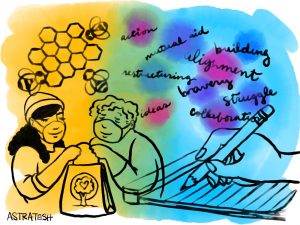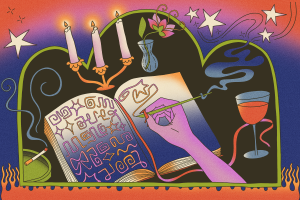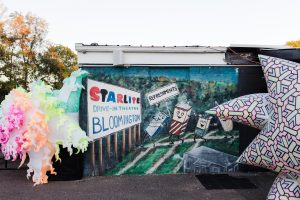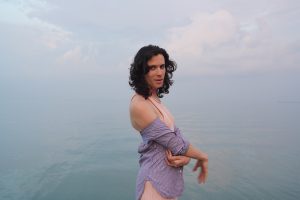“Beyond the Page” digs into the process and practice of writers and artists who work at the intersection of literary arts and other fields. For this installment, I interviewed Chelsea Fiddyment, the creator and emcee of Unreal — a fiction-focused, experimental open mic, now in its fourth year. In late June, I spoke with Chelsea about their reasons for starting Unreal, their own practice as a writer and performer, and the importance of creating welcoming spaces for experimentation.
Check out Unreal on the third Tuesday of every month, in the upstairs space at Schubas (note: this space is accessible by elevator through the attached restaurant, Tied House; ask a Schubas manager for navigation support). Find Unreal @UnrealChi on Twitter and @UnrealChicago on Facebook, and Chelsea @whatthefidd on Twitter. This interview has been edited for length and clarity.
Marya Spont-Lemus: Congratulations on a lovely third-anniversary show!
Chelsea Fiddyment: Thank you so much!
MSL: How are you feeling about that and how it went? What are you bringing out of it with you?
CF: I’m absolutely ecstatic about it. Like, I rode those good feelings all last week. I think three years really feels like when you’re starting to gain some momentum. And, as someone who is going into the fourth year having done almost everything for Unreal myself, or having had to talk with somebody at Schubas to get something done, it’s cool to see. I mean, even something as simple as asking Schubas to help us advertise. Because, technically, we went in under the umbrella of private events, as far as organizing for the upstairs space, but now that they’re starting to do comedy a little more aggressively upstairs it felt like a good opportunity for me to say, “Hey, I’ve definitely been here longer than this, and would love for you to help me help you get people in the door.” So even something as simple as them being willing to do a little extra legwork advertising for Unreal is huge for me, because otherwise it’s something I’ve been doing on my own. I use the “royal we” online on all of our social media — but it’s also literally just me. (Marya laughs) It’s a team of me, doing all of these things.
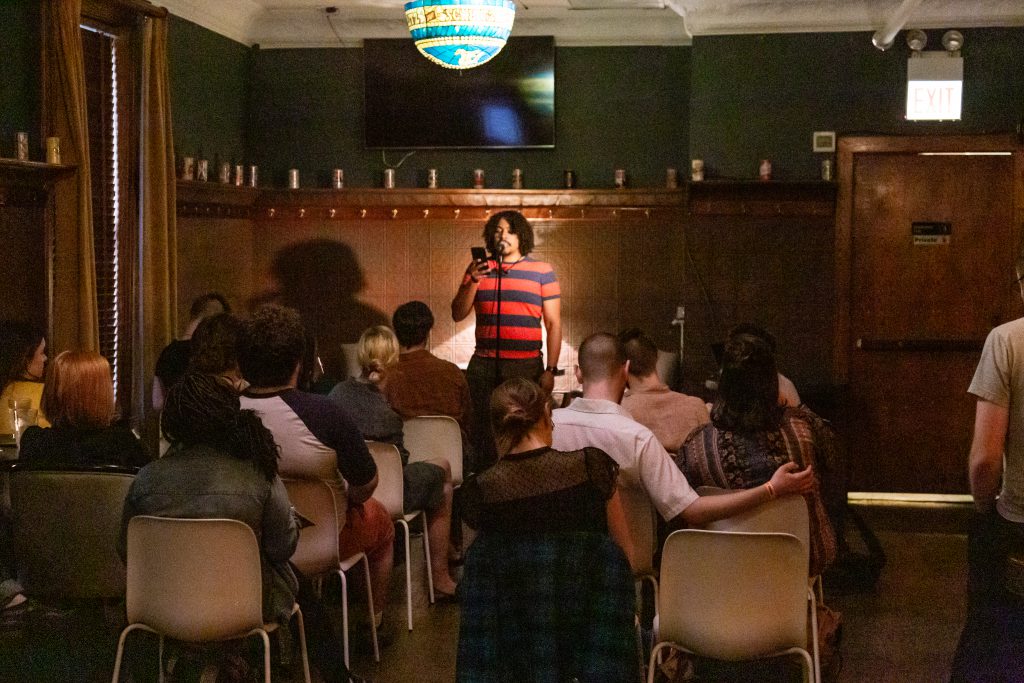
So yeah, it’s been three years, which is a long time and isn’t. I’m remembering a podcast called “unBEARable” by two queer performance artists — one of them actually used to be based in Chicago — and they interviewed Guy Branum at one point. He’s a comedian and comedy writer, and he was talking about this show he had created in LA that was a quasi-live comedy show but also kind of a fake game show? And he said that five years is really when things begin to happen. He basically said that that seems like a really long time, but when you get there it’s not a long time at all.
I also think back to when I first got familiar with events like Salonathon, and that was around their three-year mark. Salonathon and I used to share a Chicago birthday. It had gotten started right when I moved here, though I was not aware of them at that time. And then, fast forward to three years later, right after I finished graduate school, and Salonathon was really starting to be this thing that was popping off that people were very, very aware of — especially with DIY performance stuff, queer performance, all kinds of very different hybrid and experimental modes of making work. And they were doing Salonathon weekly. As a performance and variety show, basically, happening weekly, that takes a lot! And for a while JB (Jane Beachy) was the only person doing it, until adding a curatorial team. So I feel like Unreal is in very good company, I guess is the point I’m getting at. I’m in a very excited place about it and I’m excited to see what we can do going forward.
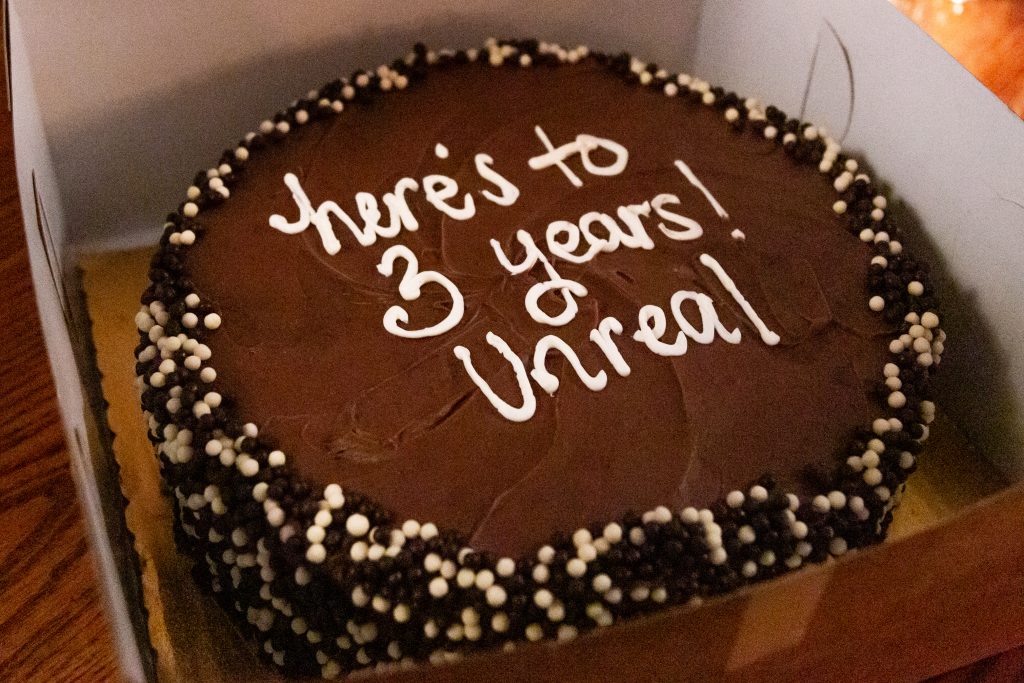
MSL: What made you feel like Unreal was something you wanted to do, that you wanted there to be a space for? Was it something you had been thinking about for a long time? Was it that there were performers whose work you thought should be sharing space but wasn’t?
CF: Mmm. Kind of a combination of all of those things.
Several years ago — pretty much at the end of my MFA, spring 2013-ish — I was working with a friend, Josh Gaines, to get a micropress called Thoughtcrime Press off the ground. We were both invested in doing handmade book binding and a variety of other text and layout work, doing editorial work, and making and getting certain sorts of poetry, particularly, out in the world — poetry because that’s Josh’s focus. I don’t write poems! I’ve never considered any of the work that I do to be poetry, despite having cut my teeth on performance at a poetry open mic here in the city — actually one of the longest-running poetry open mics in the city, Weeds, which Josh and I used to go to together before it moved to the Hideout — because they would kind of let you come in and do everything. But so Josh and I were getting this micropress off the ground, and sort of the way we had thought about putting things together was that, if we were ever going to focus on fiction, that would be my responsibility. And my thought at that time was that I would want Thoughtcrime’s connection to fiction to be something that pulled from performance in a way that I had found really beneficial to me working on fiction. It seemed like there was a broader way to be thinking about fiction in the context of performance — in a way that isn’t just necessarily, like, you have a stage monologue or a scripted theater scene, or that isn’t a musical. Right? There is some other mode that can be occupied there, that is still overtly identifiable as fiction and sticks to that in some capacity, but isn’t necessarily married to being on the page. That was something I was very interested in doing, and Josh wasn’t. I wanted to be able to do what Unreal became.
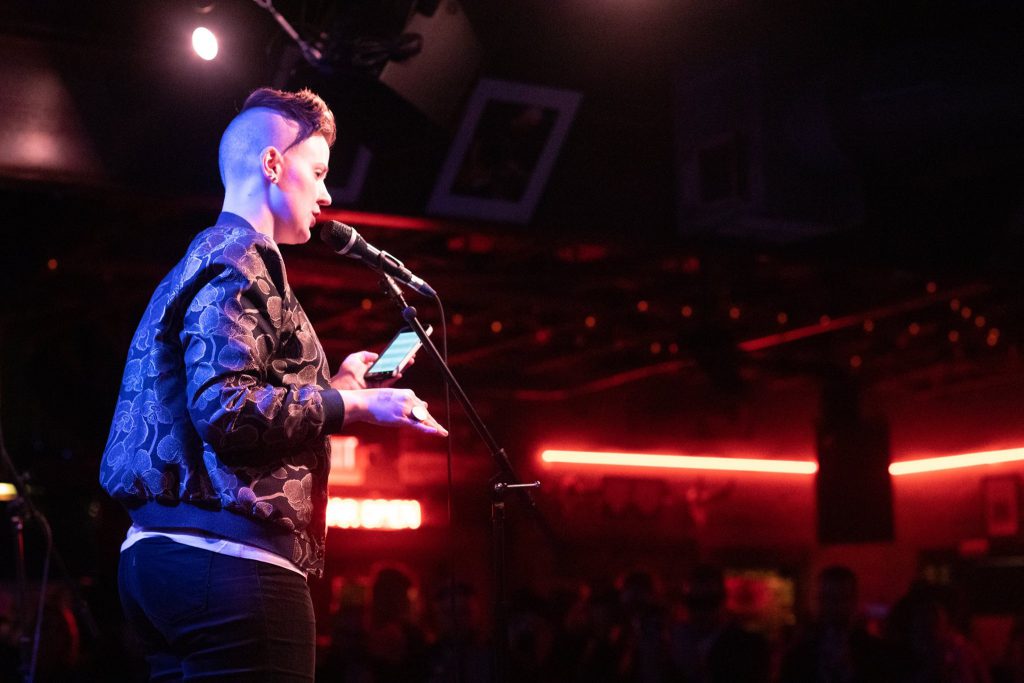
At that time, I was also dealing with some pretty complicated personal circumstances, including being in an abusive relationship, so everything was pretty tumultuous for me immediately following graduate school. Josh and I ended up bringing another colleague of ours on, who was a poet — again, mostly things at the press were geared towards working with poets — and ultimately it reached a point where Josh and I had kind of too many conflicts about how we wanted to proceed and what we were each interested in doing. So I decided to bow out from that. And, at that point, the thing I really wanted to do was to get an event like Unreal off the ground.
At that point, too, I was looking for a full-time day job, and there were just a bunch of other things going on in my life. And I was going out to house shows and DIY events with other performers, other readers, other people that I knew through the scene here and through school, and I kept talking about this event that I wanted to do. And I just kept talking about it and talking about it and talking about it. And I definitely felt like a huuuuge failure, because I was like, “Why haven’t I gotten this started yet?”, even though there were so many other things going on in my life.
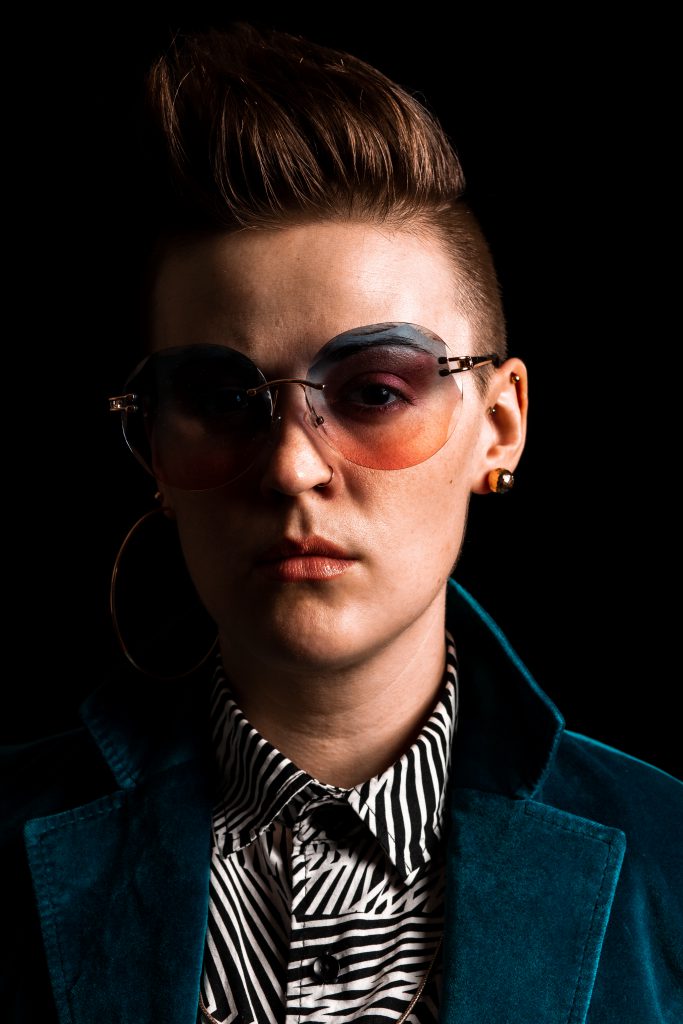
It took me a couple of different campaigns, sort of, over almost a three-year period after I graduated from my MFA program to finally find a place that would let me do Unreal. I reached out to other club venues that I was very familiar with, as someone who goes out and sees a lot of live music and goes to a lot of shows. I tried pitching this to a variety of other places and either did not have venues get back to me or they were giving me these outrageous numbers. I remember that I talked to Double Door — R.I.P. — about using the Door No. 3 space. And they were like, “Yeah, that sounds great, we’ll put you on a trial period for two months and see how it goes. We need you to do like $1500 on the bar.” And I was like, “This is–”
MSL: (laughing) “Let me reiterate the description of the event to you.”
CF: (laughing) “This is a real esoteric open mic, friends. Ooh, boy, we will have it for two months, and then no one will see us again.” And I definitely didn’t want to go through the hassle of having to try to tell people about a venue change — because you lose people that way. You don’t want to pop up someplace and then immediately have to move.
I kept thinking about it and thinking about it, and finally I ran into Cameron McGill, a friend of me and Josh’s — an incredible musician, incredible singer-songwriter, incredible poet. Cameron had left Chicago to do his MFA in poetry at the University of Idaho and I ran into him at AWP (Association of Writers and Writing Programs conference) in Los Angeles in April 2016. I was like, “Yeah, I’m trying to do this thing, maybe this is something you would have insight into, because you’ve performed at a bazillion places in Chicago” — he’d lived here for over a decade. He was like, “You should talk to Schubas! They have a beautiful, tiny upstairs space. I did a songwriter’s residency up there.” And I said the thing that everyone says, which is: “They have an upstairs space at Schubas?” At that point it was mostly private events, although I think there was maybe like one night a month when they were doing comedy also. And he said, “Just contact Terri Champelli, the private events organizer. If you want to mention me, go for it.” And Terri immediately was like, “Great. This sounds fantastic.” When I asked her about bar sales minimums, she was like, “What? Let’s get it started!” And she was willing to give me the room for an absurd deal, that no one else in the city was willing to do for me. It ended up being just the right-sized space, just the right kind of vibe. So that’s what we’ve been doing ever since.
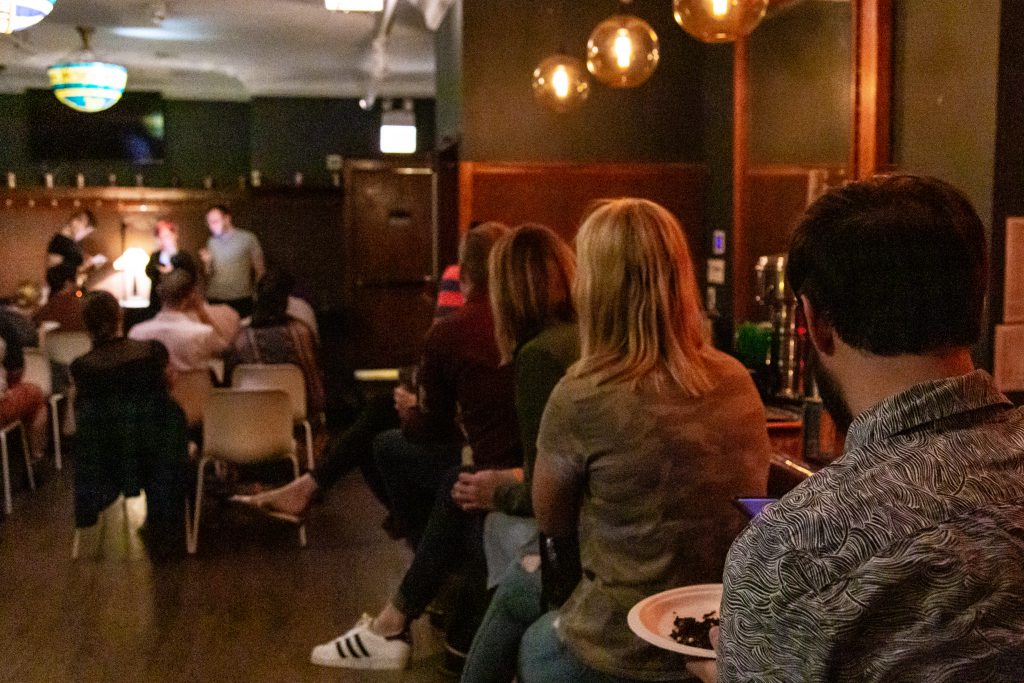
MSL: Yeah, I thought that upstairs space was very striking. I’ve been meaning to ask, is there a way to get to it by elevator?
CF: As of very recently, yes. That is something I think about very often, being in that space; we’re there because it’s an affordable place for us to be. Until the restaurant construction was finished, it was unfortunately only accessible by those back stairs, which have railings. We are lucky enough to be in a position where things are amplified in terms of audio, but we don’t have an interpreter. That’s something I would love to expand into doing as the show gets bigger. And, of course, if there is any additional assistance that anyone needs I am more than happy to help with that.
MSL: So it sounds like, once you ran into that friend at AWP, things really started happening.
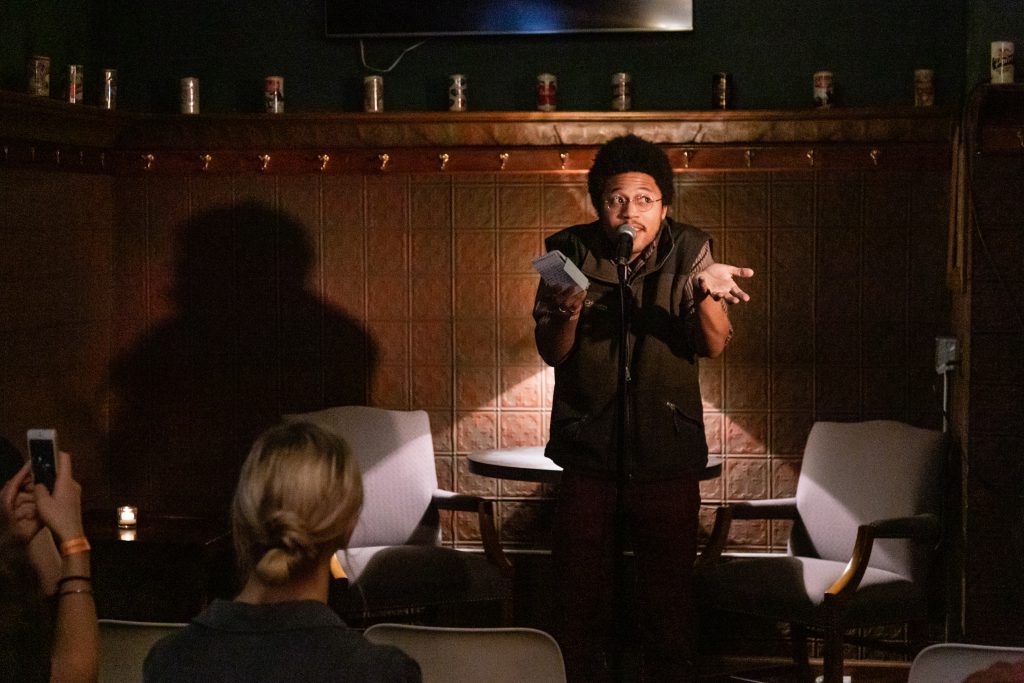
CF: Yeah. Unreal was something I had thought about for a while, and then tried to make happen for quite a while, and then finally came to being in that zone. Part of the reason we ended up approaching it the way we did was because, to what I mentioned before, I think there is a unique space that performance and fiction can occupy together. I say this as someone who has been a classically trained vocalist for 20 years; I’ve done jazz performance, I’ve led a band. Like, there’s all these other things that go with having performance skills. I’ve been to my share of book readings and releases where somebody has their face completely in their book and doesn’t look up at a crowd, and does not know how to read a room, and seems absolutely terrified of being in a room with people. And I’ve been to really great events, where people mostly are just interacting with people and asking them questions, and then doing real performances of their work, in a way that completely changes how you go back to the work after that point. So I wanted to be able to pull some of my performance skills into my fiction.
The other thing, especially having come up in the poetry open mic scene, is that there was nowhere else in the city doing an event like this. I would still stand by that now. I’m familiar with a couple of salons that will, like, allow fiction to be there. I’ve never met the organizer who does Gumbo Fiction Salon — I don’t know if they’re still at Galway Arms — but they’ve been going for quite a while and anyone can come read whatever form they want — fiction, poetry, whatever. Though they do have a feature, they do have a cover. And what I wanted was that old-school, 30-year, Weeds model, which was: no feature, no cover, whoever the fuck comes in the door can come in here and share whatever. And maybe it’ll be awful! And maybe it’ll be great! But the whole vibe is that you’re coming and bringing something, and everyone’s looking for something different out of being in this space, and we can all be here doing it. And experiencing each other and culture in this city in that way.
And even thinking about word order, I knew I wanted it to be fiction, but I also didn’t want to say, it’s an “experimental fiction open mic.”
MSL: Yeah! Yeah.

CF: The whole point is that it’s an experimental open mic — like, that is a whole other thing than just saying it needs to be experimental fiction. That’s something I did very deliberately. Especially having gone to Salonathon and having had these other experiences where you could have crazy degrees of multimedia and find ways to work that in. And also having gone to Brain Frame — another defunct series; some of those people have resurfaced as part of Zine Not Dead. But Brain Frame was a performative comics reading, which I went to like right when I first moved here for graduate school. There were all these crazy multisensory things people were doing while they were sharing their comics on a screen in front of people — a really interesting way of reading those things aloud, as it were. And I wanted that approach to be the thing that we did. Because, like I said, I knew there were no other explicitly, only fiction events. Because there’s so much great poetry in this city, there’s so much great performance–
MSL: And personal essays! There’s tons of events for performing non-fiction.
CF: Yes! Yeah yeah. With the rise of quote-unquote “storytelling” — and that’s something that I usually have to walk through for people when they come in. Like, “Nope! It’s not a storytelling event.” There are tons of those, which is great. Those things are excellent, and valid, and fantastic. Especially as someone who has volunteered extensively with youth in the city, as they’re writing about their experiences, I think those stories are very, very important. People should feel absolutely encouraged to tell their stories in whatever way they choose. And, on top of that, there’s the part of me that feels very strongly that if fiction is a way we process and make meaning of a lot of those same experiences, then we can experience those things just as strongly, just as viscerally, just as emotionally, as we would if we were reading somebody’s account of the thing that “factually,” quote-unquote, happened in their life. So that was what sort of pushed me in the direction of, this is the way this needs to go, this is the way Unreal needs to be done.
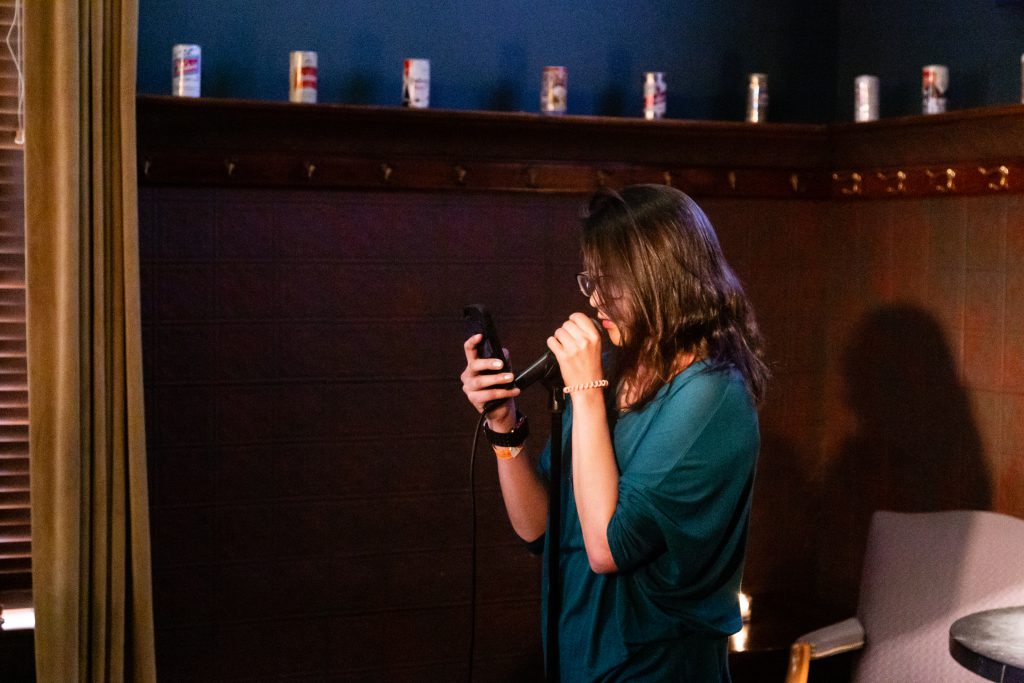
MSL: The framing on the website and elsewhere is that Unreal is a “fiction-focused, experimental open mic.” It seems that that word order — a “fiction-focused comma experimental open mic” — reflects a lot of what’s important to you in the event. I’d love to have you break that down a bit, and especially the use of the word “experimental.” From my view as an audience member, one way I see that idea of an “experimental” open mic being manifested is that Unreal seems like a space where people are going to experiment? That is, “experimental” as in relation to a verb–
CF: Yes.
MSL: –not just as an adjective describing the piece of writing that they’re doing. It can also be that, but so many people have gone up — even in just the two shows I’ve been to — and been like, “Well, I just finished writing this and want to hear how it sounds!”
CF: Yeah! Right! Yup!
MSL: You know, “I thought I’d try something new.” At the third-anniversary show, I remember this guy saying — and it was probably partially a joke — something like, “Last time, I read absurdist erotic fiction, and that didn’t go how I thought, so this time I’m going to read young adult fantasy.”
CF: Oh my god. Yeah.
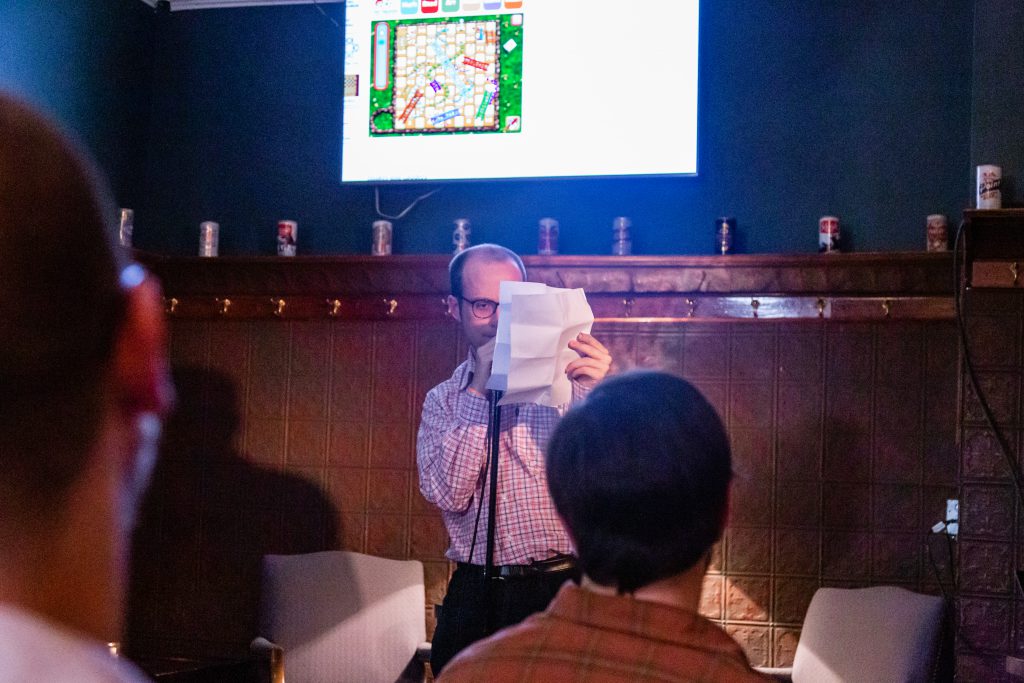
MSL: (laughing) Just that attitude of, “Heck, I’ll try this other thing!” And then there are the various modalities that people at Unreal are using, of course, to make experimental work that involves fiction. I mean, you could call a lot of it “experimental fiction” — or, sometimes, “chance-based performance art using a computer.” But the act of experimenting in a space where it feels like one can do that seems really important, even for those sharing more so-called “narrative” fiction. It feels very much in the blood of the room. I think part of that feeling comes from the fact that there does not seem to be a particular style, genre, even length, that people are gravitating towards in their pieces. At the recent event, I remember that somebody did a 6-10-word story? And was like, “Now I’m done!” and we’re like, “Oh. Okay!” (laughs) Things like that.
But I think a huge part of it also comes from the way that you emcee and produce the event, which is that you seem to know or want to get to know everyone who shows up. That is, part of its “open mic”-ness is in how open you are to others. Supportive, too. I remember at the first show I went to, you were like, “Reach out to me if you have tech needs! So I can make sure we meet your tech needs!” And I imagine that might in some ways be exhausting and in other ways feed extroversion, but, from an audience position, it seems like you are very welcoming and even community-building for folks in a way that helps make it a place where people might want to experiment. I personally think having that space is especially important if you’re working experimentally or trying something new.
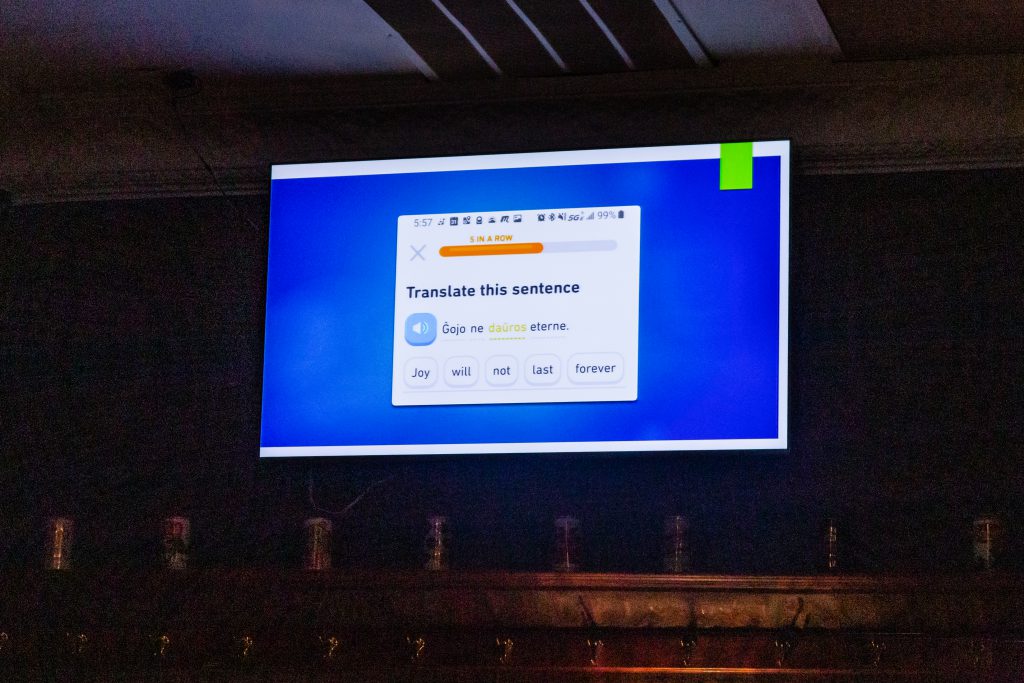
CF: Yeah! I would absolutely agree with what you just said. By the same token, I absolutely always want this to be something where people are welcomed and where they feel like they can connect and engage with each other and talk with somebody about their work afterwards or beforehand. That’s something I’ve come to really appreciate about it, and something that I try to think about, too, in terms of the work that I share.
It’s interesting; I had a friend say to me, about the work that I perform at Unreal, “A lot of times it seems like the words are maybe less important than the action that you’re completing?” I think that’s a fair criticism. That’s more of a personal critique — that’s literally exclusively a personal critique. But I think I do that exactly for the reason you just mentioned, because the thing I always want to do is be a representative of the energy I want the show to embody, of what the show has the capacity to do. And so any of the absolute wildest, collaborative, or experimental modes of making something that I’m already thinking of — even if those things need tweaking and tinkering, and maybe because those things need tweaking and tinkering — I think this is a great place for that. I try to do that every time I’m doing something in there.
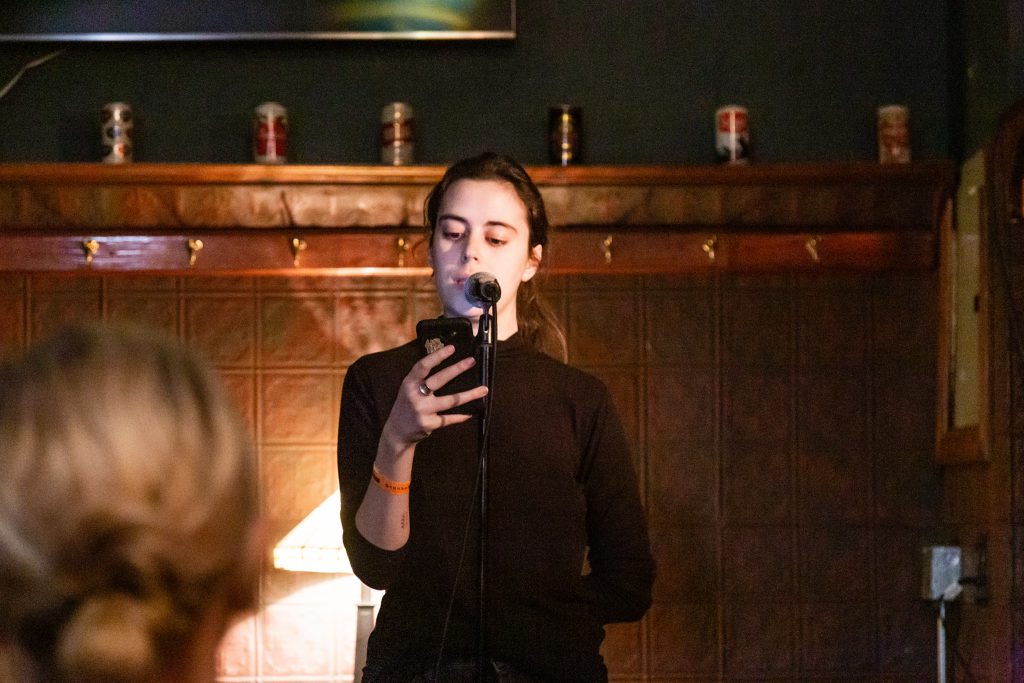
And you know how Chicago winter is — you definitely have months where you have just a small but sturdy group of semi-regulars who are there to be there. And you do want to make it something that people want to come back to, and that they want to feel comfortable inviting other people into, and proud of the things they’re doing there.
I do think that me facilitating sometimes comes at the expense of me getting to have very deep conversations with people that I do know very well who come to the event. But, as definitely an extrovert and a consummate party host, I also love pulling people into conversation and being able to get other people talking to each other and forming relationships — because then they always end up doing other events and other shit. Like they’re proofreading each other’s stuff, they’ve edited for each other, other friends are going in like, “We’re starting a literary magazine, tell people to submit stuff.” And I think we can engage people on that, and begin to really build something that not only feels like a nourishing environment for them to do things they’ve maybe never thought about doing before, and then also really incorporate that into the rest of the body of their work — to take it and get what they want out of it.
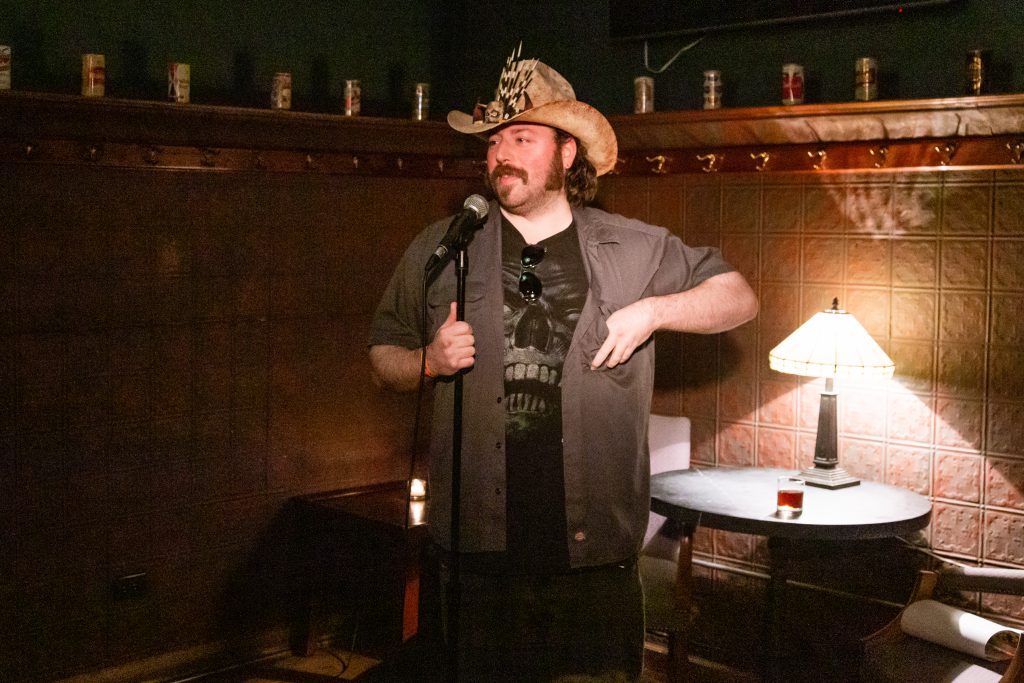
MSL: Something else I really like about the way you emcee — this sounds so basic — is that it’s so clear that you’re paying attention to the pieces! Maybe I’ve just seen some terrible hosts. (both laugh) I’m realizing as I’m talking, that might be at the root of this. But every time you go up after someone performs, you just have such great recall — an in-the-moment, cut-to-the-heart-of-it recall. Whether it’s speaking back a key phrase, or taking a nugget from the piece and building on that, or being like, “Oh, if you haven’t read this….” In the first event I went to, after one reader you talked about Jane Jacobs and read an excerpt of “The Death and Life of Great American Cities” on the spot, after another you recommended Nate Marshall’s work, other times you recommended other specific artists. I don’t remember all of them, but it was quite a range. It felt very evident that you were listening and anchoring into things that, in my opinion, seemed among the most resonant or important aspects of the pieces. And I think in a couple of instances, you were even like, “I’m going to push you on that….”
I mean, I would hope that everyone who goes to an event is there listening — and I acknowledge that it can be challenging, as a reader, as you’re sort of sitting there nervously like “I’m going to be up soon” — but I personally felt your clear attentiveness as almost an extra invitation to try to be present. And also as a way to help thread the show together, as it is happening live in the moment. Aside from tech needs, presumably even you don’t know what’s going to happen.
CF: Oh, yeah. I never have any idea of what’s going to happen.
MSL: And that’s something I really like about open mics and such — how the themes emerge themselves.
CF: Right!
MSL: There were at least a few pieces at the third-anniversary show that were in part about geriatrics, having a busted nose, and other super-specific things in common where I was like, “No one would theme a show–” (both laugh)
CF: No. Right.
MSL: Like, “Bring me your pieces about geriatrics and busted noses!” Anyway. I just see your particular way of emceeing as contributing to Unreal’s openness, that speaks to that value or invitation of, “Be here. Right now. Listen. Connect.” Like, “I want to connect you to other people, but I also want to connect you to other things.”
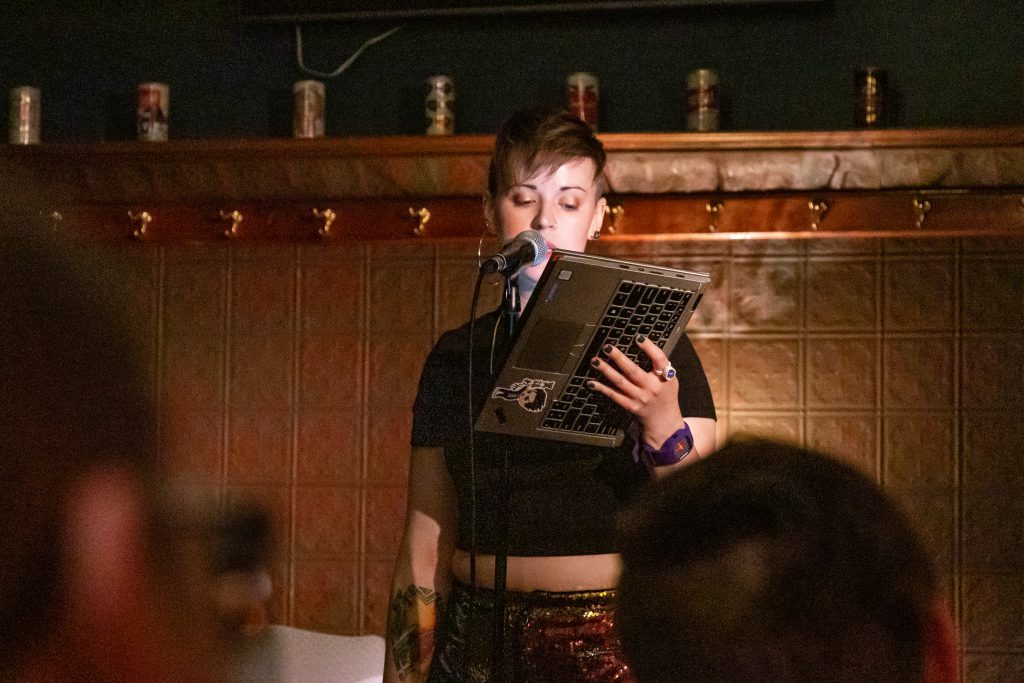
CF: Yeah. Having come from the variety of work backgrounds that I have, that’s so much just how I work. My day jobs, most recently, have been primarily human resources, where you’re engaging with people in all kinds of ways and helping them navigate systems. I’ve been a liberal arts instructor. I’ve been a writing tutor helping people through everything from long-form dialectic essays to stuff they’re working on for class to stories or creative pieces. I’ve worked with literally kindergarten students through graduate students for a lot of that. And even as an undergraduate, I worked for student housing, which was something I strongly considered doing again when I was working on my master’s.
I guess the other part of it is related to one of the best things I took away from graduate school, from one of my advisors, Mary Cross. I had brought in some pieces I was working on, and Mary mentioned that one of the most important things you can be doing while you’re working on a piece is continuing to read, and, when you encounter issues in your work, to be looking for solutions in the work of others. Like finding your way into new texts that are dealing with the same sort of whatever that you’re working on — whether it’s a specific kind of technique, a specific subject, a feeling — and sort of working that through.
MSL: The answer is in others’ work, not necessarily in an essay about work.
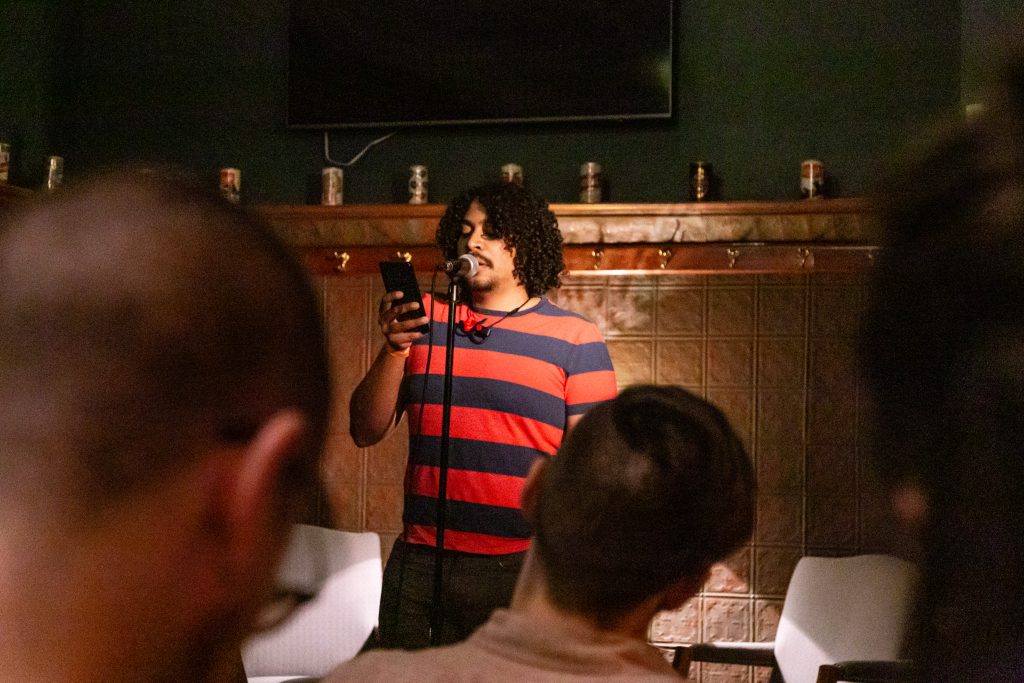
CF: Exactly. Also, then, having the wherewithal to be able to suss out the 10% of that that is worthwhile to you, and pinpoint that, and understand that — in the same way one might in a workshop setting. While it’s important that everyone else be present, with 90% of what people are going to tell you it’s like, “Cool, that misses the point completely,” “I appreciate you talking, but that wasn’t necessarily relevant.” (Marya laughs) “You didn’t quite get what I said about that.” But also there are those moments where you’re like, “Oh, if everyone misses the point” or “That’s not what I was trying to do here,” then you realize you need to make some adjustments.
Interestingly enough, for a very long time in my life, one of my personal approaches to making work has been that I know that if I’m having a problem in my work it often resembles a problem I’m having in my life. And that if I’m having a problem in my life, it’s resembling a problem I’m having in my work. And if I can solve it one place — it’s like an algebra equation — then I can solve it the other place.
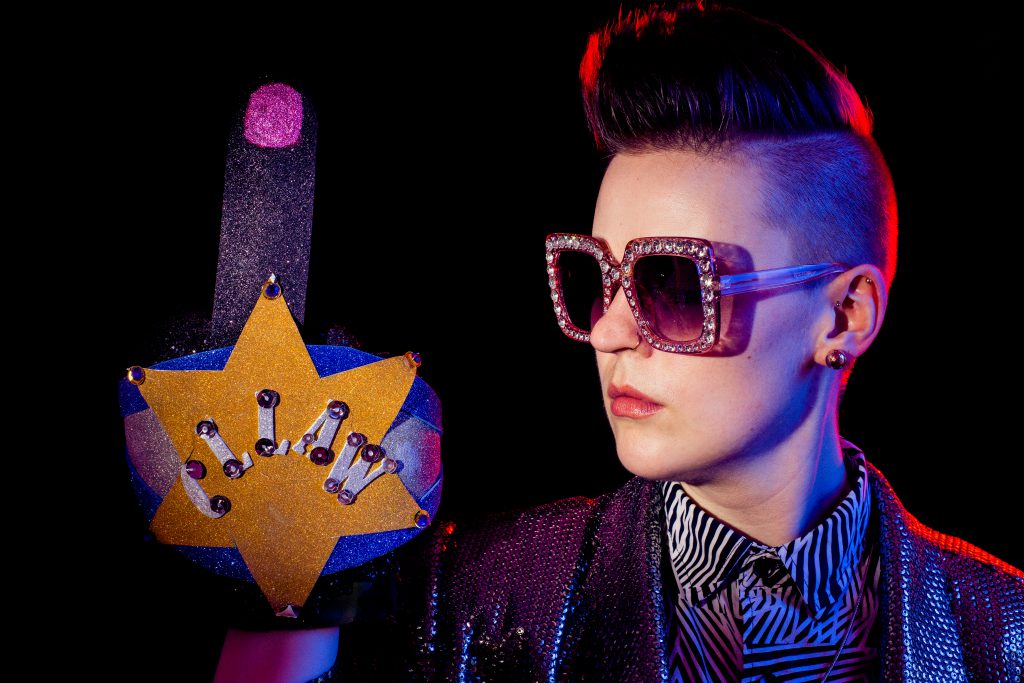
I think emceeing can be similar to engaging all kinds of creative work: A lot of what you’re doing is trying to hear something as it’s happening and make notes real quick. Like, “This caught me, this caught me, this caught me” — and pause for a second and process those notes. And, thinking back to my work with college students, a lot of it was about helping them meet each other and form communities, and me trying to be a resource to them by knowing a bunch of other resources I could tip their attention to. That’s always something that I want to be able to do and that I get really excited about, when I can tell someone about something that might be relevant to them and their work. And it’s a different conversation than someone being like, (puts on voice) “Uh, did you know your work super resembles this other thing?” There’s a difference between saying that and approaching somebody and offering, “Oh, some of what you’ve got going on here reminds me of this other thing that I think you might really be into, or that you might find really helpful to check out while you’re working on this thing. I would love to be able to give you that in case it’s something you want to seek out; you can do whatever you want with this.” That’s the teacher in me, I think. And I think it’s true of anyone in the room — whether that person writes, whether they make art at all, whether they do literally anything — every person in the room has a completely different perspective to bring to what you do and may be able to tell you one thing that you have not thought about with your work. So modeling or inviting that and helping people find work that may have answers in it for them. And I think that’s fun.
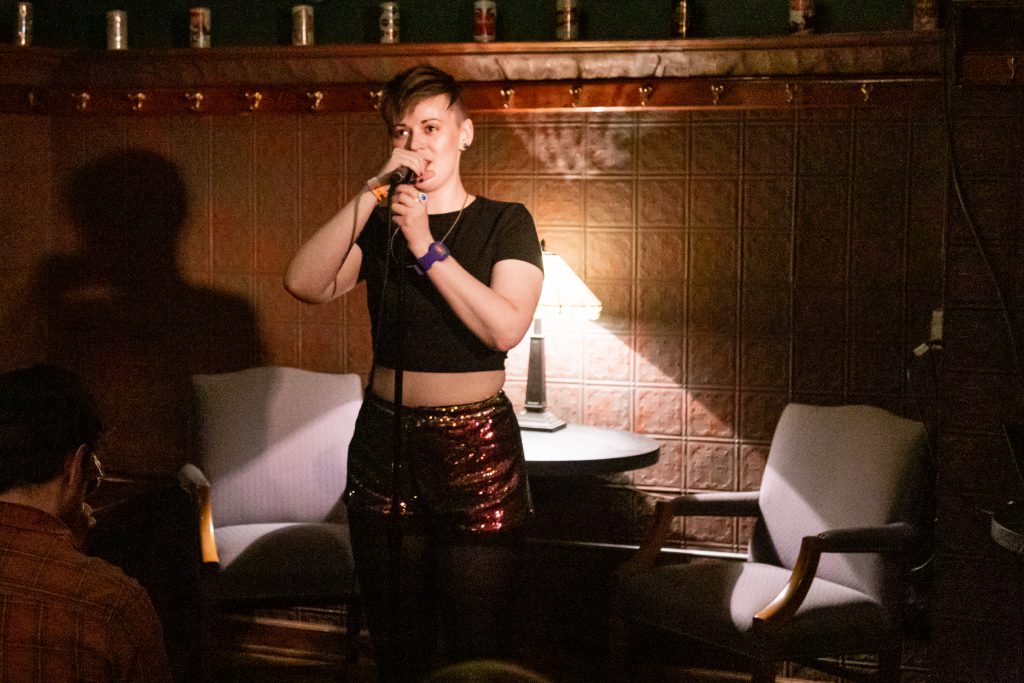
It took me several months, when I first started, to really get a feel for who I am as a host and what my own emceeing style looks like. And I think it is very much about listening for, “What is something here that really struck me or grabbed me?” What’s that positive inroad that I can start with somebody and say, “I really appreciated this thing.” And sometimes that happens as, “It made me think of this.” And so much of emceeing is also recognizing the tone of the piece, the tonality of the room, how everybody’s feeling. You know, there’s definitely been points where it would not have been appropriate for me to make a joke afterwards, or I just didn’t need to say a bunch of stuff. Other times you just have to keep it rolling. I’ve realized as a result of doing this show that so much of my own written work is also engaged really heavily with the act of improvisation, and so this is no exception. And, like you said, I never have any idea what anyone’s going to do!
I will, occasionally, do a little noodling with the lineup just to make sure things move in a way that is smooth. Also so that you have the basics of, you know, “Don’t have five cis, het, white dudes at the beginning, and then have everyone else in the second half of the show.” Right? Thinking about those things too. But also having people that are probably going to read wildly different things from each other, and trying to mix that up a bit as well. Even if I don’t know what that thing is going to be, I might have an idea, just from knowing them — or I don’t know at all, and that gives me an idea.
MSL: Especially at this point, three years in, it seems like Unreal has a number of people who come regularly or even see the show as a kind of anchor for them. Somebody at the anniversary show was like, “I found Unreal six months ago, and I just want to thank Chelsea for building this community. I love being part of this community.” All of that — the “being part of,” the “community” — I thought was so straight-up lovely. And then there was the person who shared a piece that was sort of … in homage to you?
CF: That was so funny to me. Oh my god.
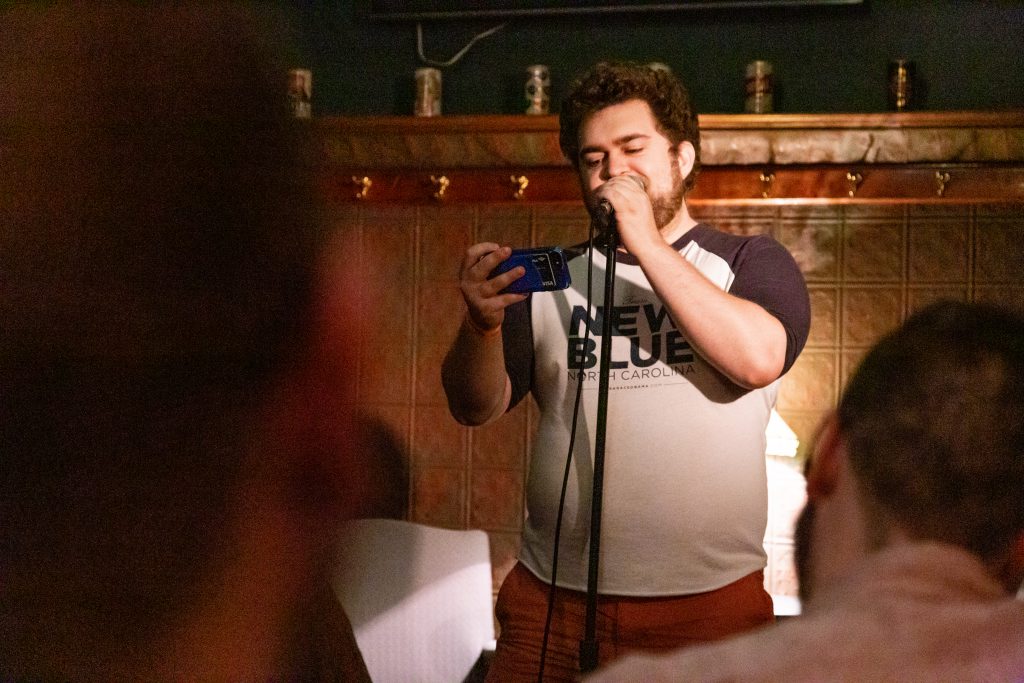
MSL: What’s rising to the top of your mind, looking back? Whether seemingly cumulative responses or certain pieces? Or, without necessarily disclosing people’s names, are there people whose work you’ve just seen change and develop and build over multiple events? Whatever’s coming to mind.
CF: There are a few things! (laughs) Actually, the person you mentioned, who did the quasi-homage piece — he’d never sung during a piece before. But I had sung at the previous show, which you were at, and I’ve done a couple of pieces where I pulled in jazz standards and a couple combinations of things from my musical background. And he was like, “Yeah, I’m going to do this!”
Oh my god. And another piece he did … I think sometime last year? At some point between two people’s performances, I had made a completely off-the-cuff comment about highly uncomfortable ASMR, and what would that look like? And the next month, he brought in this piece where he was like, “I heard ‘highly uncomfortable ASMR’ and I ran with it.” (Marya laughs) It was one of my absolute favorite things. The piece was him presenting this story from the perspective — first-person narration — of this very sketchy dentist, who’s talking this person through their dental exam experience while he’s examining their teeth. And like full-on he is just talking very quietly, is really close to the microphone, ends up using props he brought to make horrific dental noises, including him bringing in a power drill. (laughing) It was truly, truly bananas, and I loved every second of it.
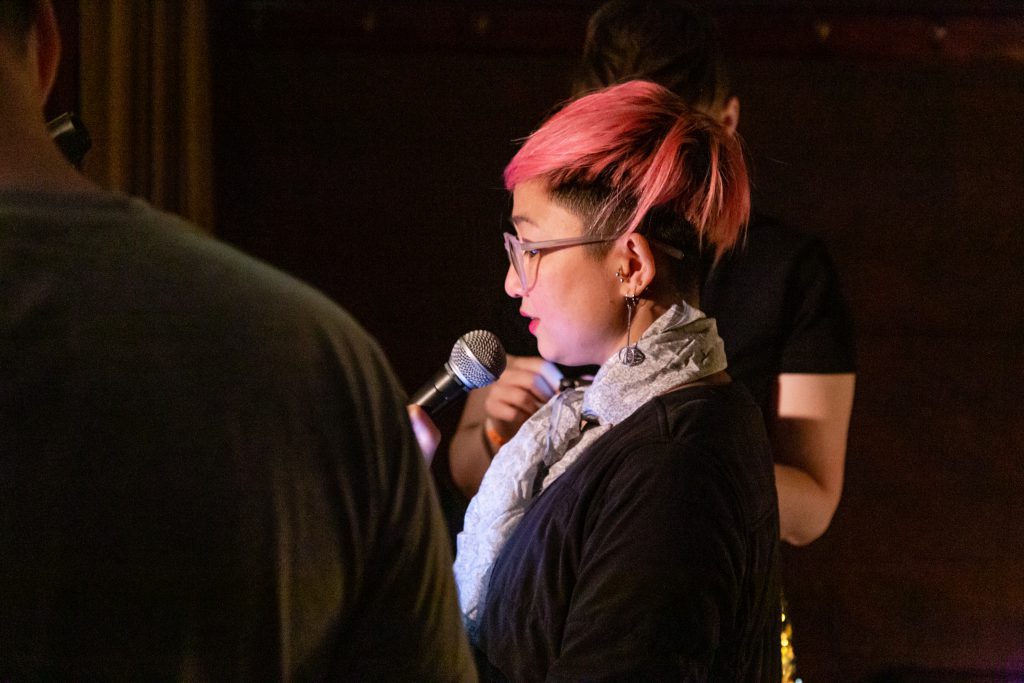
At one show, Dao Nguyen — whose play a few of us read at the third-anniversary show — performed this selection of fictional bits and essays and constructions that all corresponded to salt she had seasoned and created, and at a later Writing Group show she passed the salt blends around so that people were tasting them while she was performing these pieces. She does some really amazing stuff. Dao also has filled in as my wrestling manager before–
MSL: Ohhh my god. I forgot that you did that.
CF: The next title match for CLLAW (Chicago League of Lady Arm Wrestlers) is coming up. I am our current reigning champion. I have to defend my title as Sir Elton Brawn. (Marya laughs) So it will be a fun time.
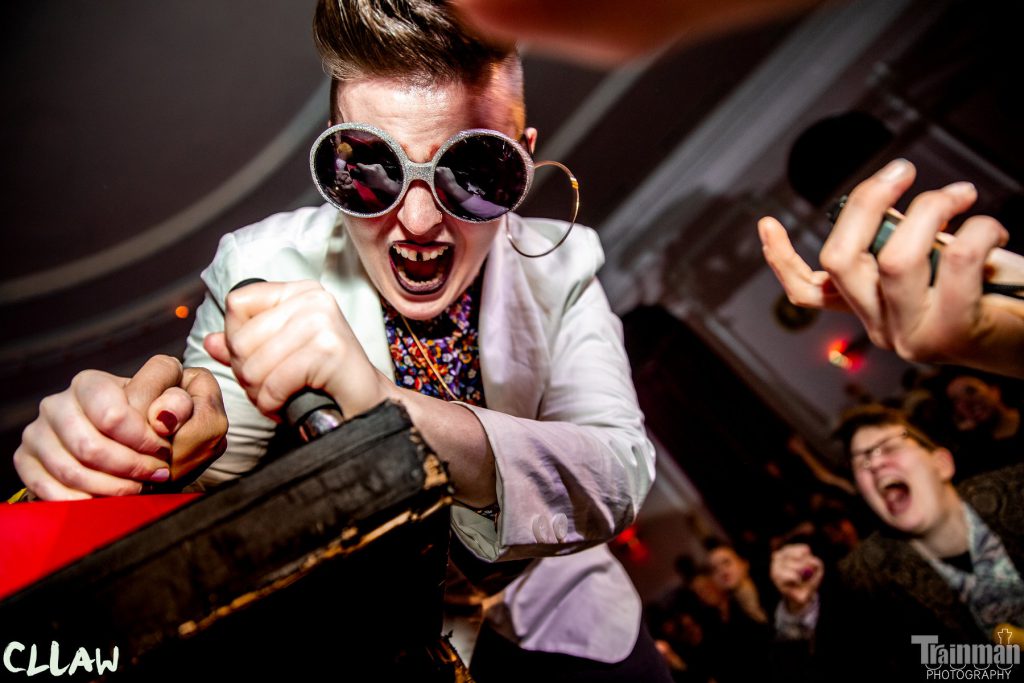
It’s also been cool to see people go from reading things on the page to coming up with something wildly different than what they first started reading. Like going from things that were fairly realistic, as it were, maybe fairly steeped in experiences they’ve had, to doing or sharing things in a much more surreal and emotional mode. I’ve definitely had people start adding multimedia elements. A person at the anniversary show performed her piece with audio in the background, something several people have begun experimenting with. And there have been people who have shown up tens of times and finally decided, “You know what? I’m going to do it. I’m going to read this time.” Some of whom told me flat-out, “I’m never going to perform here.” And I’m like, “You do you, man. I’m not worried about it.” But at some point they changed their mind or felt moved by the spirit of the room. There’s also definitely been people who I’ve seen really grow as performers. One of my favorite things about having people who are just starting to perform is that they’re like, [franticly] “Oh my god, what if I go over seven minutes? Please give me a signal, let me know, I don’t know how long it is, I didn’t read it aloud in advance–” And I’m like, “First of all, that’s not a problem….” But I did pick a seven-minute max because I think that’s about how long it takes for most people to get tired of listening and, as a performer, I think seven minutes is right about when you feel that you’ve hit a point where you can take a pause. I don’t know why that is exactly, but I think it’s true.
And I’ve liked seeing people start to feel comfortable talking to each other. Like it doesn’t just have to be them coming in, reading, and just kind of sitting there. People have made friends and hang out and it’s very lovely.
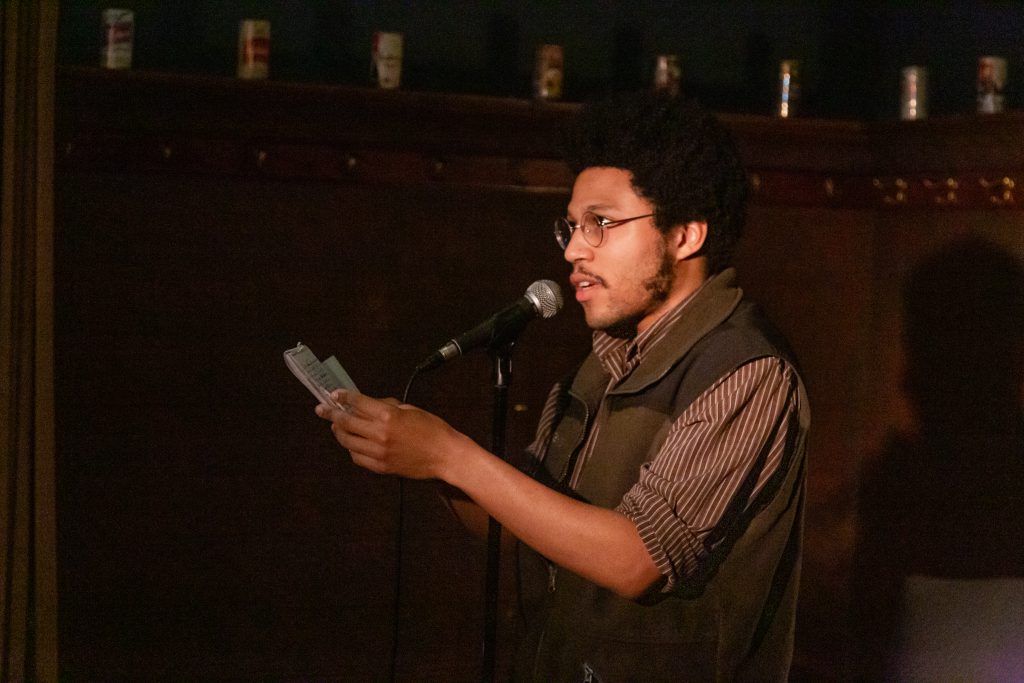
MSL: Earlier you touched upon how aspects of your artistic background, among other things, made you want to start Unreal. I’m wondering if you could talk a bit about the connection between your own creative work and Unreal. Like if you think of Unreal as part of your creative practice, or as something you’re doing that’s connected to your practice?
CF: This is something I absolutely think of as part of my work. Because I think it’s something that does take a certain amount of skill. As you mentioned, you have been at events where you have had not-great emcees. Like, it can be difficult to emcee a show! Let alone produce a show and do the legwork of talking about it to people, and being an ambassador for the show in other spaces.
MSL: And a performer, at the show! (laughs)
CF: Yes, and a performer at the show. And sometimes that’s the hardest thing for me to feel like is the thing I do. There are theoretical ways that I talk about my practice — I think that’s true of any artist. But even as someone whose bachelors degree is in literature, who loves critical theory, who loves thinking about the really academic bullshit of creative work — like I absolutely love it — it’s also very important to me to exist outside of that space.
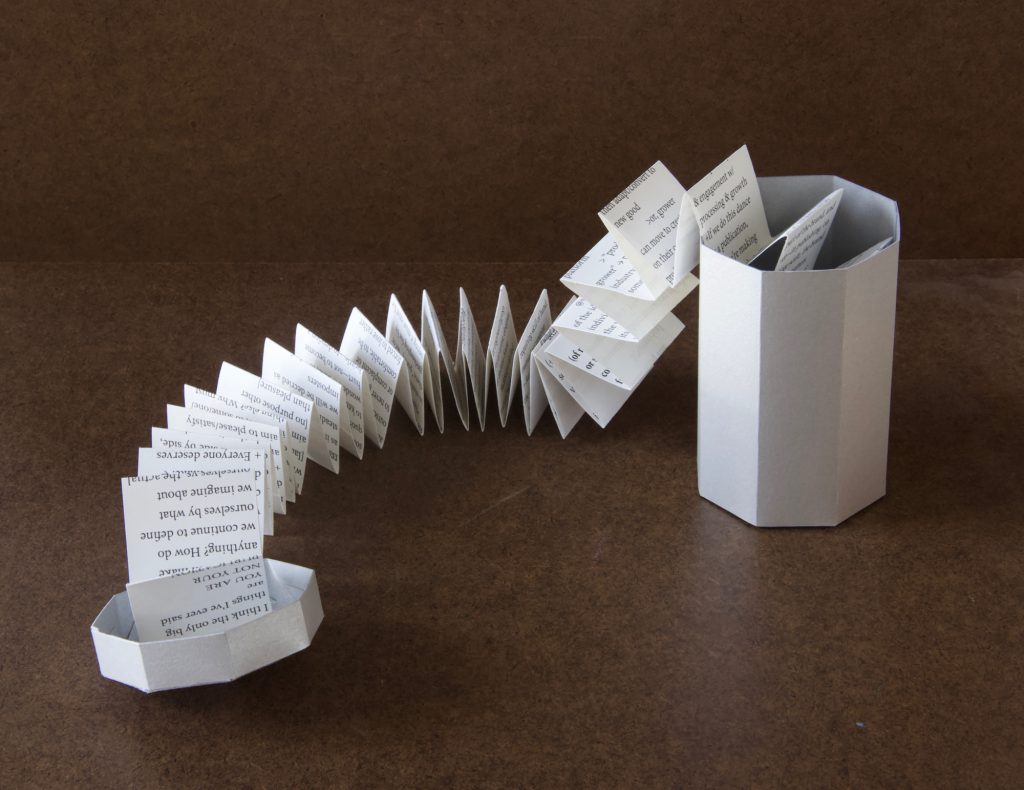
Last year, I put out a small book that looks like — that’s literally shaped like — a garbage can. It’s an accordion-fold book, so there’s five feet of accordion-fold text that is inside this trashcan, and when you take the lid off the text comes with it. It’s just a whole collection of notes from when I was writing a five-minute micro-lecture that I gave in conjunction with the release of the book — about, essentially, you’re not your publication history. And sort of a personal, funny screed about things like author bios. You know, everyone’s like, “So-and-so is from a place and they have a family and they have their degrees from blah and their work has appeared in blah.” A lot of that is reinforced by academia, and a lot of that is reinforced by people just being taught to be scared of not having credentials to give people. And I feel like the thing I want to be able to do with that is just completely blow that up entirely. When I give a bio for anything, I try to just be like, “Yes, I host an event. What’s my most important thing that I want to rep and get people to, and what’s some weird bullshit I can say about myself.” Which is part of the reason I often jokingly refer to myself as a “trash teenager.”
MSL: As a what?
CF: As a trash teenager. That’s my aesthetic. All of that is to say, I think it’s very important to be thinking about how you exist in the context of those privileged and academic structures, and I think it’s incredibly important to be thinking about how you exist in the context of a community. That then fits into a whole other conversation about the citizen-reader, as it were — like the person who is engaged in making sure that they go to other people’s shows and buy people’s books and do these things. But also, how can we be building out greater structures with greater funding and greater support for us to not be the only people who are only representing ourselves and talking to an echo chamber of people about creative work? Because work should be accessible!
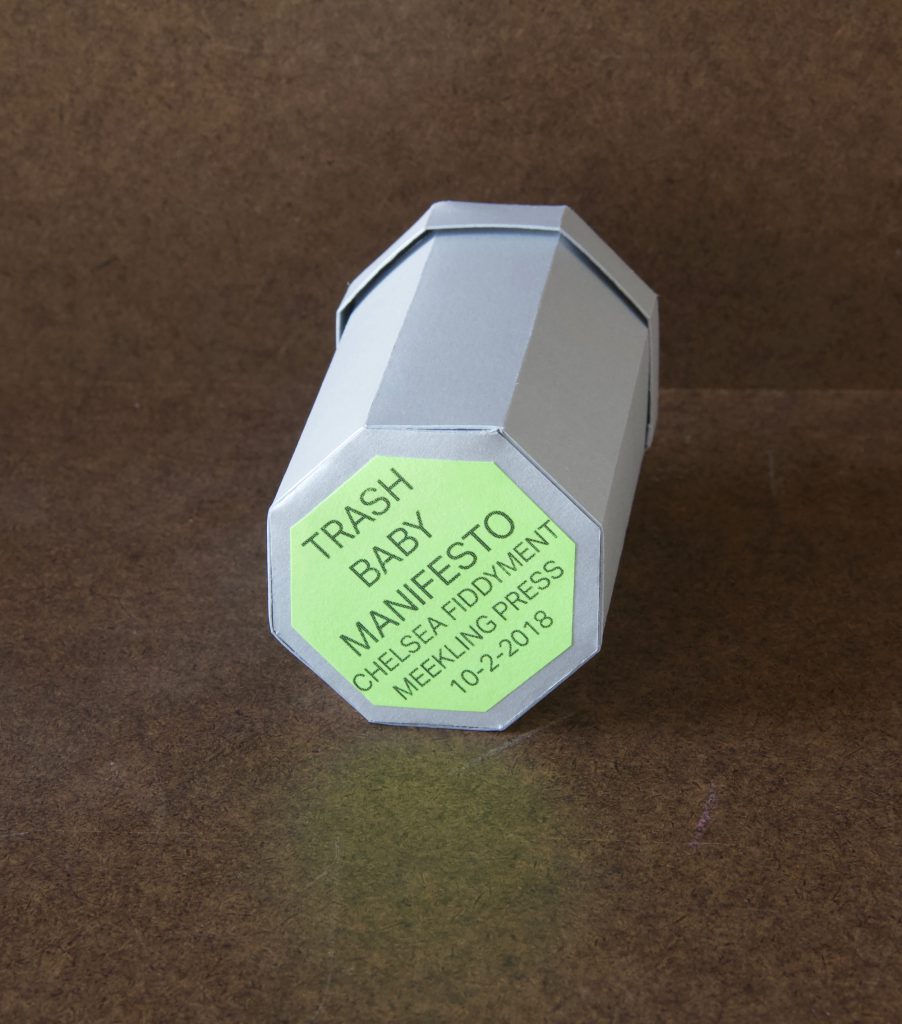
That’s the other thing, thinking back to academic and privilege structures. It doesn’t have to be direly serious all the time, which is part of my straying from photorealism as an aesthetic. It can be fun! And that’s important. It should be pleasurable. It should be uncomfortable.
I also try to continue participating and learning in other community spaces, to help focus my energy on my own work and performance. I’m part of a group that grew out of a bunch of people at SAIC that’s just called Writing Group, that’s women and non-binary folks. There’s different 6-10-week “terms” and it’s totally decentralized leadership, so different people in the group decide what we’re doing for those several weeks, and it usually culminates in some kind of performance. We get to know each other and each other’s work better from being in that space.
With all that in mind, Unreal is both sort of an anchor for me and a built-in opportunity to push myself. One of the standards I hold myself to — unrealistically, for better or worse — is that every single performance that I do, every single show that I do, I try to do something I’ve never performed before. Often that means me creating a lot of new work that I’m just getting started, which is its own interesting approach. I’ve learned to be okay with that, to embrace that. That can be really useful. And there’s definitely points where I go back to older pieces, especially if I feel like performing something is going to get me back into working on it, and especially if it’s a crowd that hasn’t heard it before or that I feel like it’s going to be good for. I usually don’t decide what I’m reading, even at my own show, until after I get there and am able to read the room. For me, it’s the same principle with karaoke — as someone who deeply loves karaoke. There’s an approach to karaoke where you’re just going to go in and do whatever song because it’s the thing you wanted to do — or you read the room and do something where you’re going to get people along with you, and everybody’s going to have a fun time and they’re going to participate. You know, you can’t just hamfist your way going into something and do the absolute saddest shit you can possibly think of every time you do karaoke. Because that’s not necessarily the vibe of the room. If given half a chance, I would close every karaoke night with Robyn’s “Dancing On My Own.” Is that always appropriate? No! So having Unreal there means I have something in my month where I have to bring something new.
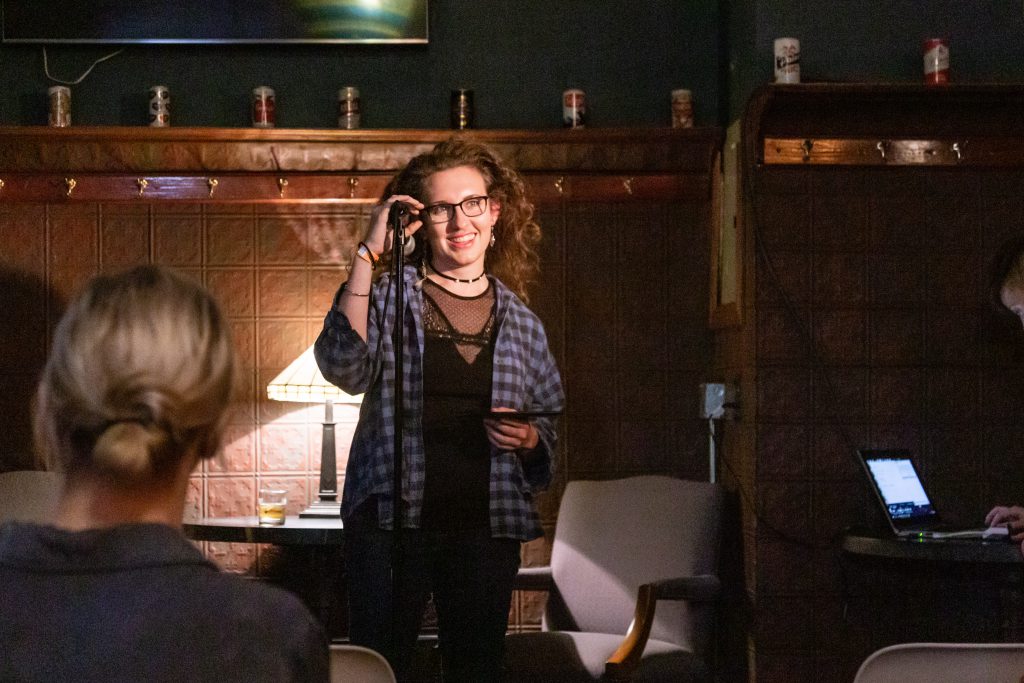
The build-out for me, also as part of my practice, is, how do I build out what we’re doing at Unreal into a larger organization where we’re doing more stuff? The way I’m thinking about that right now is, how do I put myself in a position where I can be offering people publication opportunities or giving people more opportunities to perform outside of just this space? How do we make this something where we are creating a larger apparatus that is able to do more and engage people in other ways, and give people opportunities, and really make that happen with the cred I’ve been able to build doing this? And also, frankly, the tenacity, because I’m someone who, if you’re going to let me talk for this long, will somehow convince somebody to put me in charge of something. So, to me, the show in and of itself is part of that organizational building, which is something I care very deeply about. I’m constantly thinking about it in terms of its structure, if incorporating it into an LLC is a thing we should do. Should we look into purchasing ISBNs, so we can get these things actually tracked and recorded in places?
MSL: You mean the live performances?
CF: Not just the live performances, but actually working towards finding modes of unique publication that also are integral to the performances and to the ways those pieces of media exist. And working through that. In my own work, some of the longer pieces I’ve been doing recently I absolutely know are book projects — each one a single, very long, short story, for which I already have a book prototype in mind that I need to sit down and build out a couple versions of to see if that’s the design I want it to be.
My own obsession in my work — and maybe this speaks to me doing the show — is the intersection of form and content, and how can they both be equally representative of the experience that the artist is presenting you. How can the form further the content, and how can the content further the form? Instead of taking for granted that a book is going to open one way, in order to be sold for commercial publication; it’s going to have a certain set of dimensions, so it can sit on a certain standard-size bookshelf; it’s going to essentially move linearly through time, because you are only reading a single direction because most marketed publication in the U.S. is in English. Even if it’s modular, you’re ultimately probably going to start at one cover that is considered to be the beginning, and you’re going to end up at the other cover, which is considered to be the end. But there are all of these different modes you could be in — this is where the theoretical brain part of me comes in.
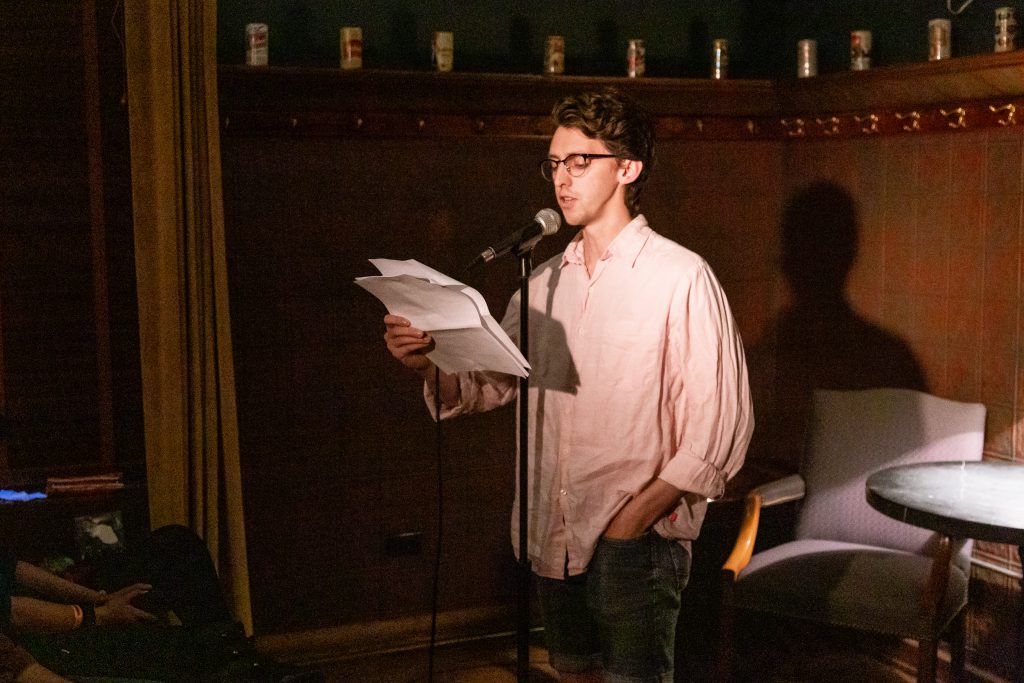
So, as far as my own work, I want to be able to satisfy all the itches I have in some capacity — and sometimes maybe that’s asking myself a little too much. I would love to get back to doing an analysis column. I would love to be looking at critical issues in narrative, theoretically as well as contemporarily, as far as how things exist. I think narrative fiction occupies a uniquely commercial space that poetry doesn’t necessarily have to, so there are very interesting ways of navigating that space that create problems but also provide opportunities. I want to be able to talk more about those structures. I want to be able to put together some handmade book projects and do small editions of those — because I definitely have ideas in mind for how those should look. In particular, I have a recent piece about this person who moves into a house where all of the surfaces are entirely mirrored. The piece goes back and forth between the narrative parts of the story that are moving things along and the interstitials, which are the narrator thinking through a bunch of stuff, talking to themselves but also to the reader. I want to design something that reflects the grotesque, bodily nature of that, but also the anxiety that comes with it, as far as just looking at yourself constantly in whatever capacity that means. So I’m envisioning the book as having a center hole cut-out with mirrors inlaid on the inside of both covers so that, no matter what the reader is doing, they’re always uncomfortably looking at themselves. (Marya laughs) That kind of effect is something I’ve experimented with in performance, like having people film themselves on their phone cameras while I’m performing — which is something I did at the Test Literary Series at the Whistler.
So there are modes where I’ve tried to figure out, what does that look like on the page? What does that look like as a book? But also what does that look like when I share it, in public? As someone who played video games, I’m always very invested in finding ways that I’m collaborating with the audience in some capacity — in anything I’m putting out, whether it’s a book or something created or published digitally. I’m interested in finding ways that someone is interacting with my work in a unique and particular way.
The other thing is that I have a whole bunch of academic interests I’d love to get back into, as far as writing about stuff. The literary and film studies class I taught was actually about drag and gender performance. I would love to get back into doing scholarly writing about drag at a time when it is really hitting a large-scale contemporary heyday in a very interesting and messy sociocultural way — where a lot of it has been very overly capitalized, a lot of it has been sort of overly TERF-y [Trans-Exclusionary Radical Feminist] and very trans-exclusive.
I’m always trying to find modes of satisfying each of those things I’m thinking about, and Unreal is definitely one component of that, in addition to it being an impetus for me to continue making individual works. I actually have three pieces being published in Goliad Press’s “by a thread [a spiderweb salon anthology],” which should be out later this year.

MSL: Building on what you’ve just said, and even judging from the way you emcee, it seems that you seek broadly, absorb deeply, synthesize many things that other people may see as being unlike. The extent of that kind of engagement with the world seems to be a particular skill and practice of yours.
Going back to that idea of “answers are in the work,” “models are in the work,” I’m wondering if there are particular artists whose work you find yourself being really drawn to in this moment — whether people who are themselves alive and working today or not. Or are there certain artists you find yourself returning to again and again, or works where you especially remember their initial impact on you? Like, “Oh, you can make a film that way!” or “Oh, it can be good to make people uncomfortable.” Broad questions, I know, but if one of those invites something.
CF: Sure, yeah. One example that comes to mind is anything where you’re like, “Oh, I didn’t know that could sound a way.” When I was around 12, a friend introduced me to Pavement. As someone who sings, I’m particularly drawn to melodic vocals. Pop music is, of course, a very natural extension of that, because you stay very much in that territory — same with choral music, classical music. And, suddenly, this person was sending me music that was really crunchy and fuzzed out and low-fi, and I was like, “You can make shit that sounds like you made it in someone’s garage?!” I was very excited about that and it has stuck with me.
Aimee Bender’s fiction is definitely something I return to on a semi-regular basis. I’ve read both of her novels and three of her short story collections. The short stories, especially, still super stand out to me, because she’s writing these very surreal things where it’s just like, “Cool, we’re establishing rules, we’re establishing laws of the universe of this story, these are factual laws of the universe, and here we go.” It doesn’t necessarily have to be this giant, over-explanation and the logistics of why that has to be true — there can be other ways to do that. Her work is something I think about very often.
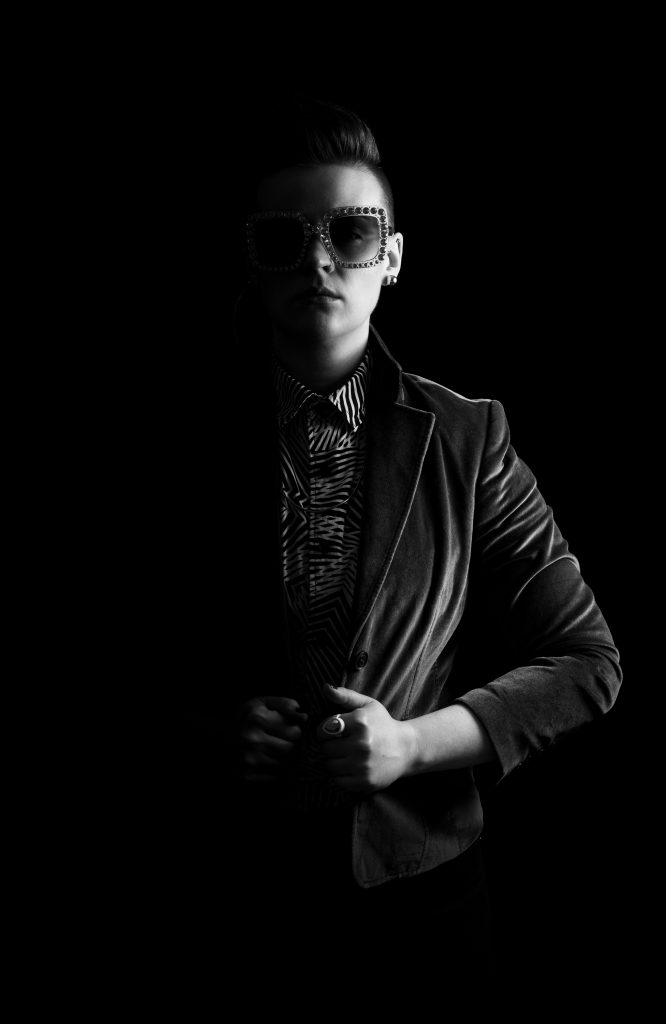
I love finding very dense things to return to. Recently, I’ve been thinking really heavily about George Eliot’s “Middlemarch,” which is just an absolutely, absolutely fantastic novel. She’s such a brilliant writer. Especially for the time this novel is coming out, it’s incredibly incisive, and her sentences are so beautiful, and so dense, and so rich. You kind of have to read only a few pages at a time and just sit with it and let it percolate.
As someone who almost did comparative literature, I’m also really interested in translation and various modes of adaptation. Something I’ve thought about extensively is looking at a bunch of not “Western” fables but especially a lot of Hindi language and Persian or Farsi language works, in translation. I actually was having a conversation about one today. It’s an extremely long poem — technically, I think it’s an epic poem — written by this very famous Persian poet named Ferdowsi — called the “Shahnameh,” which loosely translates to “The Book of Kings.” It’s story after story after story of “there was this guy and there was this guy after him and this guy after him” and all these wild things that happen to them. In that way, it’s similar to “One Thousand and One Nights.” I’m interested in these works that have essentially similar scaffolding, but there’s different tweaks and approaches. I’ve actually seen “One Thousand and One Nights” adapted into a very accurate, only mildly complicated board game, called “Tales of the Arabian Nights,” where you’re switching pieces out and implementing things based on rolling a die and using preset matrices to read through this story book, and working on performing those bits and pieces with people.
I’m especially into contemporary film adaptations of other works. I absolutely adore Hindi cinema, in part because there’s so many analogues between older Hindi cinema and Golden Age Hollywood tunes and American jazz standards and opera and the way that those musical structures function. There’s a really great director, Vishal Bhardwaj, who made a trilogy of films in the 2000s that are all more modern-day, Hindi-language adaptations of Shakespeare, set in India. I find those to be really, really compelling, in terms of thinking about how adaptations and remixes function and the different modes in which that is happening and the layers of that. I also really like Saradindu Bandyopadhyay, this author working in early- to mid-20th century Bengal. At the time, you’re seeing all these novels that are very capital-M “Modern” coming out of that area of India — for a variety of reasons, but I think also because you have the influence of the British Raj when it was there. And what I’d like to imagine based on my own reading and conversations is that Bandyopadhyay comes along and is basically like, “Everybody loves these detective stories, everybody loves Sir Conan Doyle’s ‘Sherlock Holmes,’ what if we make a perfectly Indian Sherlock Holmes?” Ultimately he comes up with what can certainly be seen as a Bengali take on that character, named Byomkesh Bakshi, and his stories become one of the single most adapted sets of stories in all of India. This became an immensely popular serialized television program that reminds me very much of early BBC dramas, in that they’re very low-budget but very good, very compelling. And these Byomkesh stories have been adapted into films several times, exploring a range of historical experiences.
And — as someone who has worked in and thinks theoretically about drag — I also think a lot about the intersections between, like, cheese and camp? Especially purposeful cheese and purposeful camp, and how those things exist.
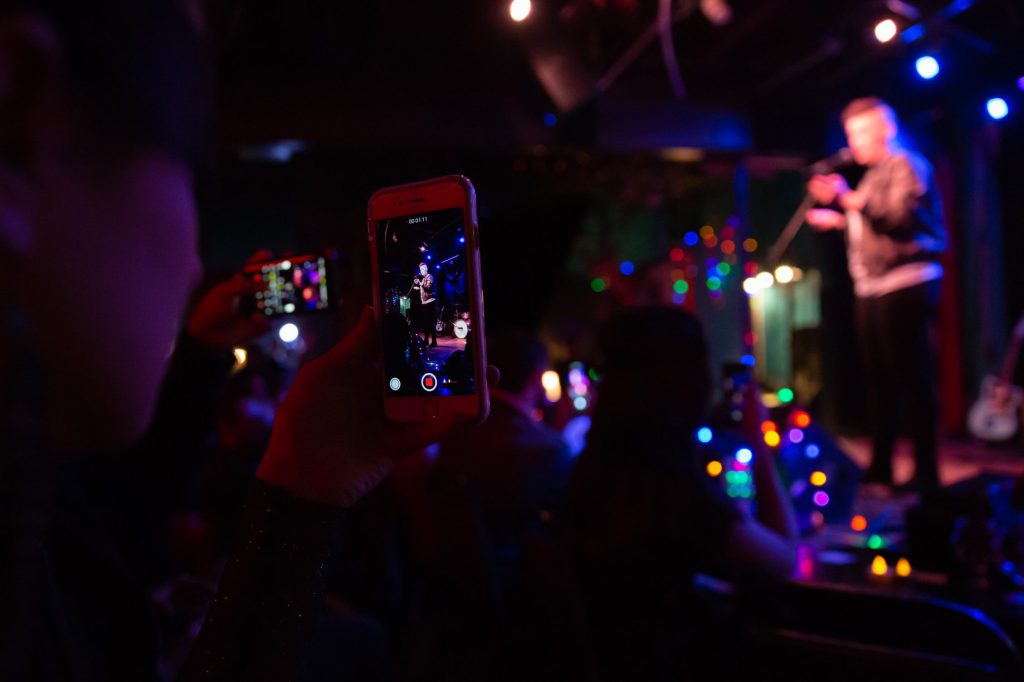
MSL: I guess to close, what do you feel like you have learned through doing Unreal? How do you feel like you’ve grown through it? And how can people support it?
CF: I think it’s something that’s given me complete leeway to fully lean into being an extrovert — whereas I’ve had experiences in my life that made me feel very anxious about being overwhelming to people when I interact with them, because I’m, essentially, a cartoon character. (Marya laughs) You know, in terms of my mannerisms and approach to stuff — big gestures, huge energy, being extremely excited about people’s projects. So I think Unreal has really encouraged me to embrace something about myself and the way I operate that seems different than other people I know — like I don’t know a lot of people who are out there in that way as much as I am — and has helped me find ways to engage that in the way that I care about most, which is bringing people together. And to encourage people to keep thinking about what they’re doing! And keep thinking about how they get to conscientiously occupy space with each other and with other people’s work. So that has been huge for me.
Also, Unreal definitely makes me sit down and do pre-programming, and plan and get things organized over a longer period of time than I might do for myself for my own things. The other side to knowing that improvisation is a significant part of my practice is that I can’t allow that to be me flying by the seat of my pants all of the time. As far as ways to support what we do, we recently started a Ko-fi page, to start doing a bit of donation-based fundraising, which has the possibility of turning into subscription-based support. That’s something I’m trying to think with an eye towards. Part of the reason I’ve been the only person working on Unreal is that I feel very strongly about compensating anyone who works with me on this. Even if someone loves the show, even if they love being part of the community, I never want them to agree to be in a position where it’s okay to not get paid for that. Because your time is worth something. Otherwise, you have to understand that it’s not an exchange — that you are donating your time. I feel like half the reason I’m able to do this show is because of having mostly worked a 9-to-5 job for the last several years. That makes it a lot easier, if you’re making that money, to funnel it into other stuff you do — and nobody gets to have a say in what you do because you’re funding yourself, which is also something that’s deeply important to me.
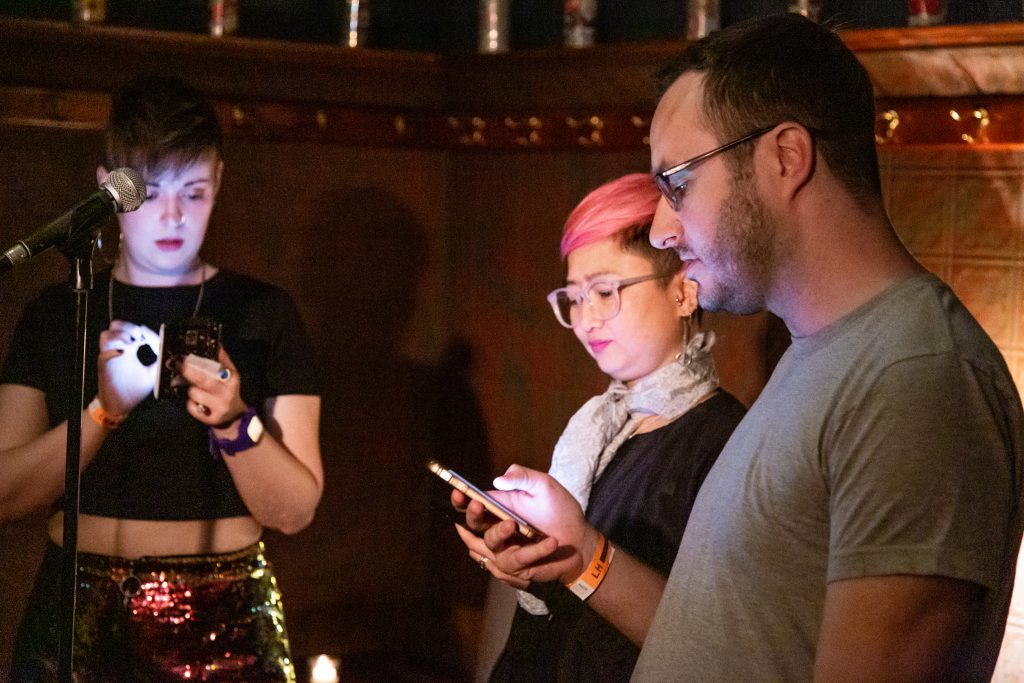
These days, especially while I’ve been seeking out other work opportunities, I’m obviously having a more difficult time footing the bill for show expenses on my own. So I’m thinking about finding ways that we can gather up extra funds and use those explicitly towards doing publication, towards show touring, towards having shit in other spaces, which is basically events production stuff. That’s a lot of the expenses. Or maybe for me to be able to give people a small stipend if they’re going other places and doing things. So finding ways to make that work and ways I can provide links for people. Folks can keep their eyes peeled for our first-ever fundraising cocktail party, which we’re hoping to book before the end of 2019.
Otherwise, people can support by just coming out on the third Tuesday of the month and seeing folks! Like I said, it’s the way that I would like it to be forever — no feature, no cover. It will always be a free show. The other thing I try to tell people about Unreal is that you as an audience member are just as much a part of this show — a performer in this show — as I am, just by being here. Your presence at the show is equally as meaningful and critical as somebody getting on the microphone, because we all want somebody to be able to be in that space with us.
And talk up the show to people. That’s the great thing about having a monthly event. We’ll still be there. Come by when you can.
Featured image: Chelsea Fiddyment performing at Unreal at Schubas. Fiddyment stands at the front of the room, notebook in hand, speaking into a microphone while looking out at the audience. Behind Fiddyment is a copper-colored wall, made of a grid of low-relief tiles; above that are several decorative beer cans on a ledge and a dark green section of wall. Fiddyment wears a black cropped tee and red and gold sequined shorts. The backs of some audience members’ heads are fuzzy in the foreground. Photo by Joshua Clay Johnson.

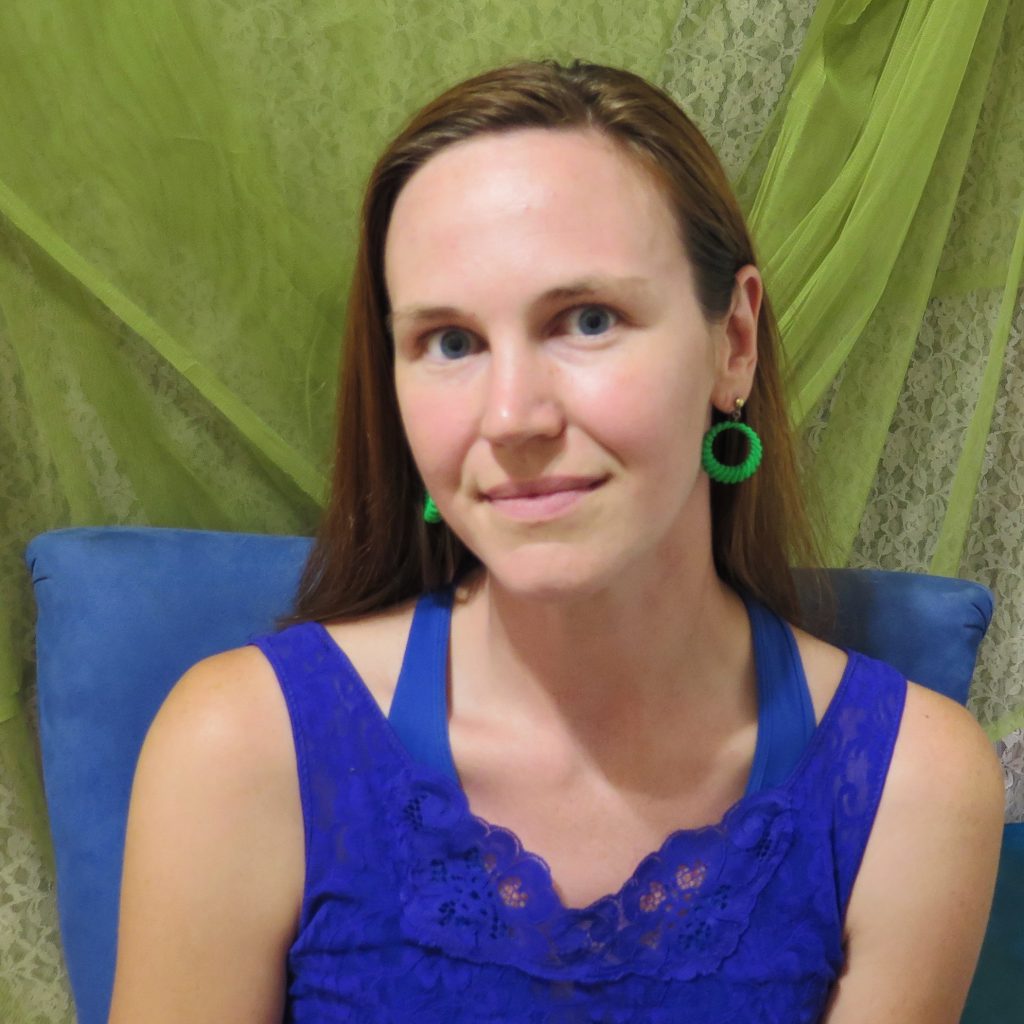
Marya Spont-Lemus (she/her/hers/Ms.) is a fiction writer, interdisciplinary artist, and educator focused on teen creative, leadership, and professional development. She lives and works on the Southwest Side of Chicago. Find her on Twitter and Tumblr.
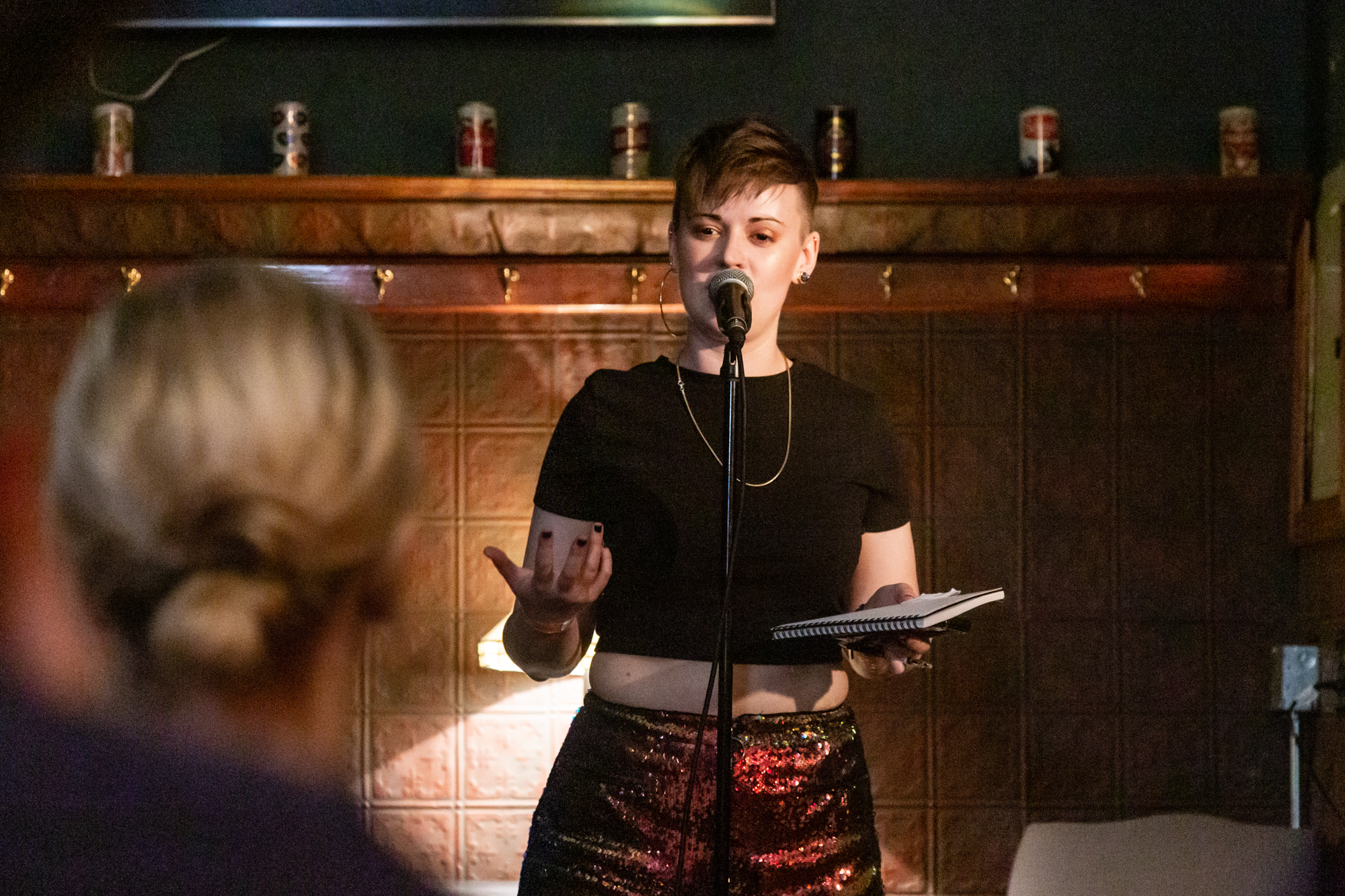
![[placeholder image]](https://sixtyinchesfromcenter.org/wp-content/uploads/2020/12/Quenna-Lené-Barrett_Headshot-300x99.png)
